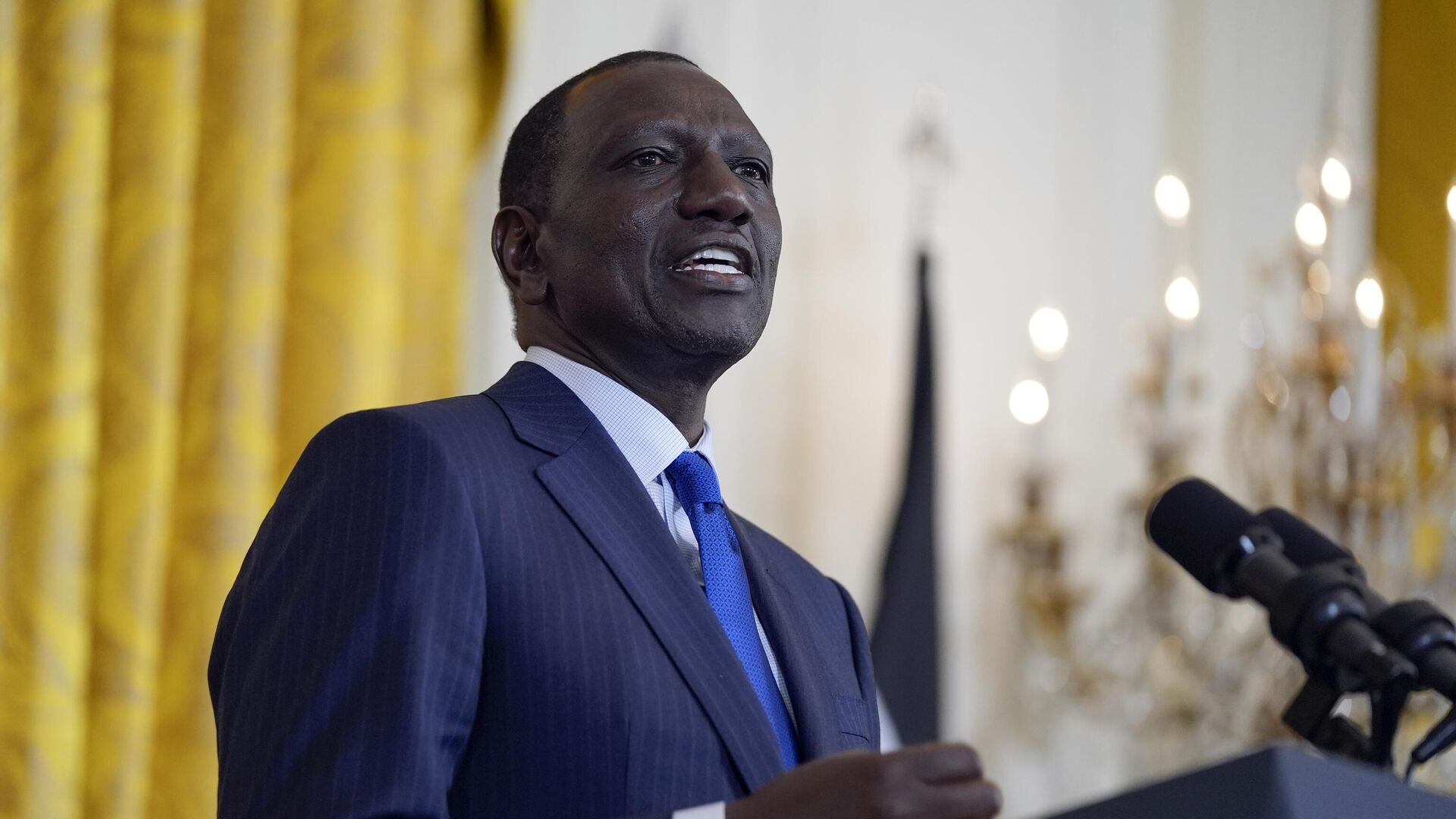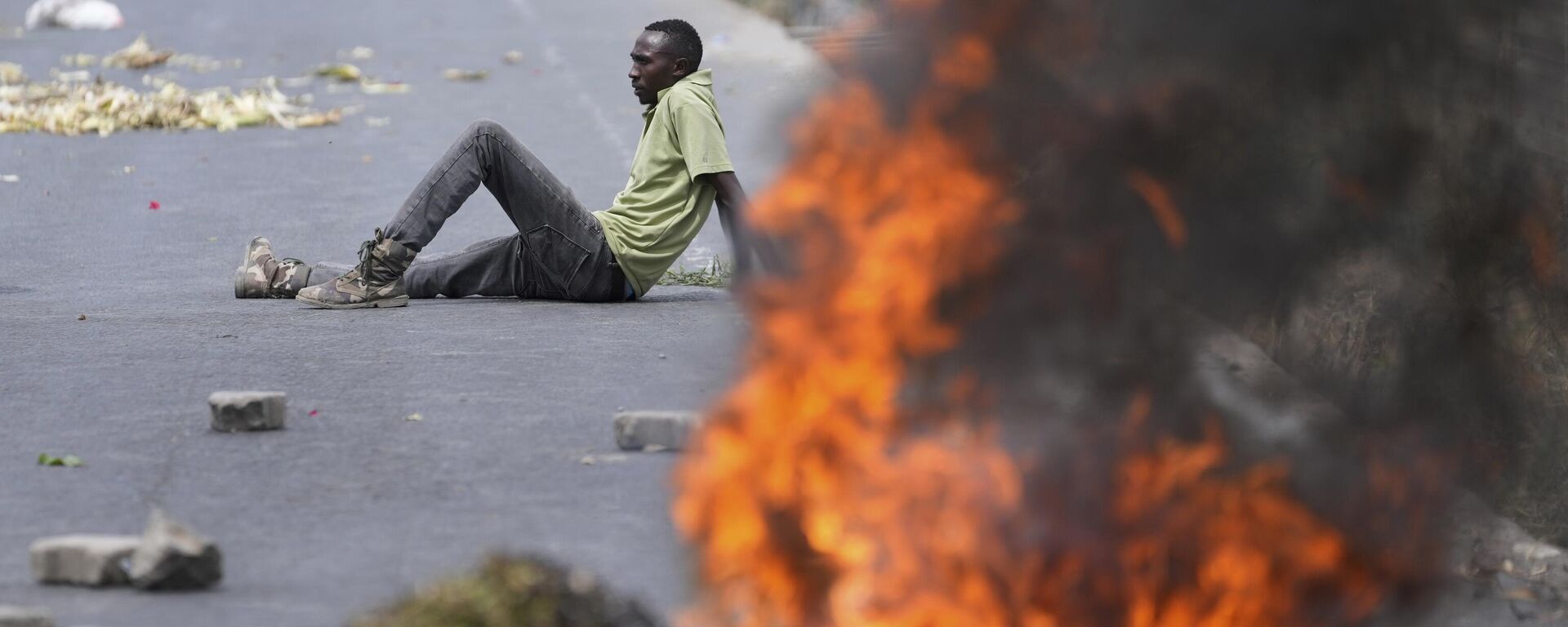https://en.sputniknews.africa/20240719/kenyan-president-launches-process-of-forming-new-government-appoints-11-ministers-1067560628.html
Kenyan President Launches Process of Forming New Government, Appoints 11 Ministers
Kenyan President Launches Process of Forming New Government, Appoints 11 Ministers
Sputnik Africa
In mid-June, Kenya witnessed widespread protests following the government's introduction of a bill that imposed a 16% VAT on bread, sugar, transportation... 19.07.2024, Sputnik Africa
2024-07-19T19:05+0200
2024-07-19T19:05+0200
2024-07-19T19:18+0200
sub-saharan africa
kenya
nairobi
william ruto
east africa
international monetary fund (imf)
protests
social unrest
taxes
economy
https://cdn1.img.sputniknews.africa/img/07e8/06/1b/1067250323_0:0:3072:1728_1920x0_80_0_0_cca4e947f968e2492d8510c65a4554a7.jpg
Kenyan President William Ruto nominated 11 ministers on Friday, intended to form the core of a "broad-base" government aimed at quelling unrest that has rocked the country for over a month, resulting in deadly protests.Six of the ministers were part of the previous government, which was dissolved on July 11.Interior Minister Kithure Kindiki, Defense Minister Aden Barre Duale, Environment Minister Roselinda Soipan Tuiya, and Urban Development Minister Alice Wahome have been retained in their roles, while two others have changed positions (Davis Chirchir from the Energy Ministry to the Roads Ministry and Rebecca Miano from the Commerce Ministry to the Justice Ministry, a first for a woman).However, the ministers still need approval from parliament.Ruto, alongside Vice President Rigathi Gachagua and Foreign Affairs Minister Musalia Mudavadi, the only minister not dismissed on July 11, stated he continues "consultations" to complete his government team.Earlier, Kenya's government intensified its efforts to end weeks of protests, and police attempted to ban demonstrations in downtown Nairobi, claiming that criminal gangs had infiltrated the protests.However, on Thursday, the High Court in Nairobi reportedly temporarily lifted the police ban until a lawsuit filed by the public interest group Katiba Institute could be heard and decided.Since June 13, Kenya has been rocked by protests led outside political frameworks by representatives of "Generation Z" (born after 1997) against the 2024-2025 budget, which proposed tax hikes. Protests turned chaotic on June 18 when demonstrators briefly stormed parliament.At least 50 people have been killed since the protests began, according to the Kenya Human Rights Commission.Following the developments, William Ruto announced the withdrawal of the budget proposal on June 26, followed by the dismissal of almost his entire government. However, protesters continue to gather across the country, demanding the president's resignation.Kenya's public debt, the economic powerhouse of East Africa, stands at around 70% of GDP. The 2024-25 budget proposed expenditures of 4 trillion shillings ($30.9 billion), initially funded by tax increases on bread and later on fuels in a revised version.Moreover, the protests have reportedly led to an economic loss of around 6 billion Kenyan shillings ($46 million), according to government spokesperson Isaac Mwaura, who did not provide details on how this figure was calculated.
https://en.sputniknews.africa/20240714/kenya-reduces-budget-spending-following-nationwide-violent-protests-1067505419.html
kenya
nairobi
east africa
Sputnik Africa
feedback@sputniknews.com
+74956456601
MIA „Rossiya Segodnya“
2024
Christina Glazkova
https://cdn1.img.sputniknews.africa/img/07e7/0b/07/1063380906_0:0:673:674_100x100_80_0_0_79628b4d0cd9f29291a57aa13bbf9e7a.jpg
Christina Glazkova
https://cdn1.img.sputniknews.africa/img/07e7/0b/07/1063380906_0:0:673:674_100x100_80_0_0_79628b4d0cd9f29291a57aa13bbf9e7a.jpg
News
en_EN
Sputnik Africa
feedback@sputniknews.com
+74956456601
MIA „Rossiya Segodnya“
Sputnik Africa
feedback@sputniknews.com
+74956456601
MIA „Rossiya Segodnya“
Christina Glazkova
https://cdn1.img.sputniknews.africa/img/07e7/0b/07/1063380906_0:0:673:674_100x100_80_0_0_79628b4d0cd9f29291a57aa13bbf9e7a.jpg
kenya, nairobi, william ruto, east africa, international monetary fund (imf), protests, social unrest, taxes, economy, budget
kenya, nairobi, william ruto, east africa, international monetary fund (imf), protests, social unrest, taxes, economy, budget
Kenyan President Launches Process of Forming New Government, Appoints 11 Ministers
19:05 19.07.2024 (Updated: 19:18 19.07.2024) Christina Glazkova
Writer / Editor
In mid-June, Kenya witnessed widespread protests following the government's introduction of a bill that imposed a 16% VAT on bread, sugar, transportation, mobile and financial services, and foreign currency transactions. He imposed a 2.5% excise tax on cars and vegetable oil, implemented in response to the IMF's demand to lower the budget deficit.
Kenyan President William Ruto
nominated 11 ministers on Friday, intended to form the core of a "broad-base" government aimed at quelling unrest that has rocked the country for over a month, resulting in deadly protests.
"I have started the process of forming a new broad-based cabinet to assist in driving the urgently needed and irreversible transformation of our country," Ruto said during a press conference.
Six of the ministers were part of the previous government, which was
dissolved on July 11.
Interior Minister Kithure Kindiki, Defense Minister Aden Barre Duale, Environment Minister Roselinda Soipan Tuiya, and Urban Development Minister Alice Wahome have been retained in their roles, while two others have changed positions (Davis Chirchir from the Energy Ministry to the Roads Ministry and Rebecca Miano from the Commerce Ministry to the Justice Ministry, a first for a woman).
However, the ministers still need approval from parliament.
Ruto, alongside Vice President Rigathi Gachagua and Foreign Affairs Minister Musalia Mudavadi, the only minister not dismissed on July 11, stated he continues "consultations" to complete his government team.
Earlier, Kenya's government intensified its efforts to end weeks of protests, and
police attempted to ban demonstrations in downtown Nairobi, claiming that criminal gangs had infiltrated the protests.
"We have credible intelligence that organized criminal groups are planning to take advantage of the ongoing protests to execute their attacks, including looting," chief of police Douglas Kanja Kiricho said in a
statement late on Wednesday. "No demonstrations will be permitted in the Nairobi Central Business District and its surroundings until further notice."
However, on Thursday, the High Court in Nairobi reportedly temporarily lifted the police ban until a lawsuit filed by the public interest group Katiba Institute could be heard and decided.
Since June 13, Kenya has been rocked by protests led outside political frameworks by representatives of "Generation Z" (born after 1997) against the 2024-2025 budget, which proposed tax hikes. Protests turned chaotic on June 18 when demonstrators briefly stormed parliament.
At least 50 people have been
killed since the protests began, according to the Kenya Human Rights Commission.
Following the developments, William Ruto announced the
withdrawal of the budget proposal on June 26, followed by the dismissal of almost his entire government. However, protesters continue to gather across the country, demanding the president's resignation.
Kenya's public debt, the economic powerhouse of East Africa, stands at around 70% of GDP. The 2024-25 budget proposed expenditures of 4 trillion shillings ($30.9 billion), initially funded by tax increases on bread and later on fuels in a revised version.
Moreover, the protests have reportedly led to an economic
loss of around 6 billion Kenyan shillings ($46 million), according to government spokesperson Isaac Mwaura, who did not provide details on how this figure was calculated.



